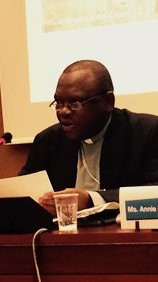Monseigneur Fridolin Ambongo Besungu challenged the international community to consider natural resource extraction in the DRC as the underlying cause of numerous and interrelated human rights violations at a UN debate on September 16th.
“The problem around natural resource extraction in the DRC needs to be redefined. It is not a question of economics or trade, it is a question of dignity and human rights,” affirmed Monseigneur Fridolin Ambongo Besungu, representing FI at a debate organised on September 16th at the UN by Franciscans International, in collaboration with the World Council of Churches, the Women’s International League for Peace and Freedom, and International Federation for Human Rights; partners committed to keeping the volatile situation in the DRC on the Human Rights Council agenda.
As the country prepares for a new round of elections, civil society is looking for ways to protect those who defend human rights, who speak out against illicit exploitation and trade of natural resources, sexual violence, the uncontrolled flow of weapons, and against the climate of impunity that makes these violations possible. The debate sought to remind the international community not only about the gravity of the human rights situation in the DRC, but also that the Congolese civil society is counting on its political pressure and financial support for greater protection of human rights and human rights defenders.
Following speakers who highlighted important human rights violations and the complex context in which they occur, Monseigneur Fridolin argued that the underlying cause of the situation was the unchecked extraction of the DRC’s natural resources and the human rights violations this implies. Forced displacement, the uncontrolled flow of arms, the proliferation of armed groups, sexual violence, and the destruction of social life – all of these could be lessened, if not completely eradicated – by a Mining Code that would address the three phases of natural resource extraction: violations committed when land is grabbed, violations committed once companies have settled themselves in, and violations committed as companies ignore their obligations give way to corruption.
Ambongo stressed that it was the responsibility of politicians and governments to ensure that natural resources benefit local communities as well as investors. “The desire for enrichment has trumped justice,” he concluded. “This is behind all of the DRC’s problems.” A testimony from the floor, detailing how an organisation that encouraged youth to get involved into politics was harassed and forced into hiding, only strengthened the need for the international community to continue putting pressure on the DRC to address the situation through a human rights lens, and to ensure that dealing with natural resource extraction is an integral part of UN recommendations to the DRC.

